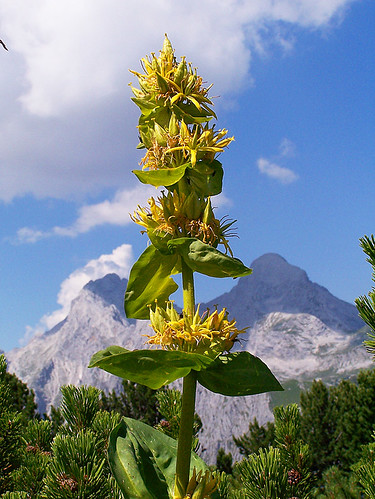Herbs: the bitterest of them all--Gentian lutea

FAMILY: Gentianaceae
MORE SPECIES: Gentiana calycosa is native to the PNW. Varieties found all over the planet.
COMMON NAMES: bitter root, bitterwort, gall weed, gentiana, gentianae radix, pale gentian, stemless gentian, yellow gentian, wild gentian, quin jiao
GENERAL:
--herbaceous Swiss perennial that has been cultivated in mountains throughout the region
--ingredient of many proprietary medicines
--contains some of the most bitter compounds known
--used as a scientific basis for measuring bitterness
--used occasionally in brewing beer prior to the introduction of hops
--principle ingredient in Angostura bitters.
--from Gentius, King of Illyria (180-167 BC), discoverer
--used in the Middle Ages as an antidote to certain poisons
--a drop in a swimming pool still tastes bitter (1:30,000 dilution)
--cold and drying
PART USED:
--root & rhizome, usually dried, usu decocted or ecapsulated, mb tinctured
--fresh herba
--root of plants before flowering or in autumn to dry
--root can be over 5 cm thick and has few branches
CONSTITUENTS:
--gentiopicrin = bitter, same as amarogentian, 1-2% of fresh root
--genistic acid
--tannic acid (very little, making gentian a pure peptic bitter)
--quinnic acid (minute)
--alkaloids (gentianine and gentialutine)
--volatile oil
--(2003) Three new triterpenoids, 2,3-seco-3-oxours-12-en-2-oic acid, 2,3-seco-3-oxoolean-12-en-2-oic acid, and betulin 3-O-palmitate, have been isolated from the rhizomes and roots of Gentiana lutea, together with five known ones.
--(1968) Gentisein, gentisin, iso-gentisin, 1-hydroxy-3,7-dimethoxyxanthone, 1,3,7-trimethoxyxanthone and 2,3′,4,6-tetrahydroxybenzophenone have been isolated from Gentiana lutea.
--Three monoamine oxidase (MAO) inhibitors were isolated from Gentiana lutea. Their structures were elucidated. These compounds, and the hydrolysis product of 1, displayed competitive inhibitory properties against MAO-B which was more effective than MAO-A.
DOSING:
--large doses can cause N/V/D and fullness of pulse, with headache
ACTIONS:
--stimulating to GI, mucosa, and portal circulation
--anthelmintic
--anti-inflammatory
--antiseptic
--bitter tonic
--cholagogue
--emmenagogue
--febrifuge
--refrigerant
--stomachic
INDICATIONS
--liver complaints
--indigestion
--gastric infections
--anorexia
--exhaustion, debility, chronic disease
--weakness of the digestive system and lack of appetite
--fortifier
--gall bladder and digestive tonic to combine with a purgative in order to prevent its debilitating effects
--portal congestion
--malaria (toxic to plasmodium)
CI's
--gastric or duodenal ulcers
--preg

SOURCES
not sure, bumped post forward from Jan 09 when I started it